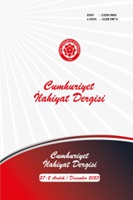Ahlaki Bir Erdemden Hukuki Yükümlülüğe: Muvâsât
From a Moral Virtue to Legal Obligation: al-Muwāsāt
Author(s): Nurten Zeliha ŞahinSubject(s): Ethics / Practical Philosophy, Philosophy of Law, History of Islam, Philosophy of Law, Sociology of Religion, Sociology of Law, Sharia Law
Published by: Cumhuriyet Üniversitesi İlahyat Fakültesi
Keywords: Islamic Law; Virtue; al-Muwāsāt; Necessity; Fard al-kifāya;
Summary/Abstract: Muwāsāt encompasses the moral duty to provide aid to those in need, prioritising those closest to us while sharing what resources we can spare. However, should a person's legally protected values be at risk, assistance and solidarity become mandatory obligations. Islamic law recognises this social duty as fard al-kifāya, with muwāsāt as the justification for this sufficient obligation. On the other hand, muwāsāt is also included in the legal justification of in-kind obligations such as zakat and alimony. Muwāsāt actually has a broad conceptual content that includes each individual in the society helping each other, sharing, and sharing what they have when necessary. The aim of muwāsāt is to keep social sensitivity towards those in need alive. Muwāsāt constitutes the wisdom of meeting the needs of the other party by sharing the resources available to each individual in the society when the legal values that Islam aims to protect are in danger. In this context, this study aims to evaluate the rights of those in need over those who have the means to meet their needs by considering the proposal in the context of the provisions. To prioritize the legal values of Islam and safeguard the sanctity of life, as well as protect bodily integrity and uphold the right to privacy, the principle of muwāsāt necessitates that all Muslims must uphold these responsibilities towards themselves, each other and the state. This study aims to investigate muwāsāt, which defines the duty to provide assistance to any individual who is cognisant of their plight, within their capacity, when their legal rights that must be safeguarded are threatened, in the framework of social accountability. In this context, it can be said that muwāsāt has a direct connection with the proposed obligations in Islamic law. Muwāsāt is included in the justification of fard al-kifāya obligations. However, the fact that the obligation of zakat, the obligation of fidya, and the responsibility of alimony are included in the legal justification of meeting the needs of the needy by those who are not dependent on anyone, shows us that muwāsāt is the basis of obligations involving cooperation. Similarly, the legal reason for banning interest is that it destroys the balance in society. In particular, the basis for the state to impose an upper limit on exorbitant prices is based on the principle that every individual has an equal right to meet basic needs. In other words, determining the profit margin in the prices of basic needs is a requirement of muwāsāt. The definition of the state’s obligation, along with individual responsibility in muwāsāt, aims to ensure that there is no individual in society whose basic needs are not met. Consequently, muwāsāt has an aspect that includes social responsibility and legal liability along with conscientious responsibility. This shows that Islam adopts the protection of life as the highest legal value. Muwāsāt is not limited to meeting basic needs, but also includes giving this support to a person when he needs moral support, sharing his pain by standing next to him, feeling him and internalizing his pain. For this reason, muwāsāt actually defines the moral stance that a Muslim should have. Based on this moral stance, it is safe to say that the most fundamental concern of Islam is to protect the material and spiritual integrity and human existence. This study aims to express, in the context of Islamic law, that the main purpose of Islam is to protect human beings in their material and spiritual integrity by examining and evaluating muwāsāt in its broad scope.
Journal: Cumhuriyet İlahiyat Dergisi
- Issue Year: 27/2023
- Issue No: 2
- Page Range: 746-768
- Page Count: 23
- Language: Turkish

